On 9th May 2022, National Energy Technology Center (ENTEC), along with Ministry of Higher Education, Science, Research and Innovation (MHESI), successfully conducted the 3rd Workshop on Enhancing Climate Adaptation Capacity of ASEAN Energy Systems through the Concept of Energy Resilience. The workshop aims to leverage the efforts of ASEAN and APEC in promoting energy resilience and also find the way to promote grassroots activities.
Dr. Sumittra Charojrochkul, Executive Director, National Energy Technology Center (ENTEC), National Science and Technology Development Agency (NSTDA), Thailand gave warm welcoming remarks to the workshop, emphasizing ENTEC’s commitment to tackle climate change issues and promoted Bio-Circular-Green (BCG) Economy to support energy resilience. Dr. Rosnah binti Abdullah, Chair, Sub-Committee on Sustainable Energy Research (SCSER) echoed in her special remarks that enhancement of energy systems should be actualized to withstand consequences of climate events and collaboration between ASEAN and APEC regional bodies should be further strengthened. Assoc. Prof. Dr. Pasit Lorterapong, Deputy Permanent Secretary of Ministry of High Education, Science, Research and Innovation (MHESI), Thailand stated in the opening remarks that energy resilience, as one of the 2021 COSTI priorities, can be a promising solution to deal with undesired climate issues, and that MHESI recognized the importance of the issues and attempted to raise awareness of the concept and trigger collaborations of stakeholders for years.
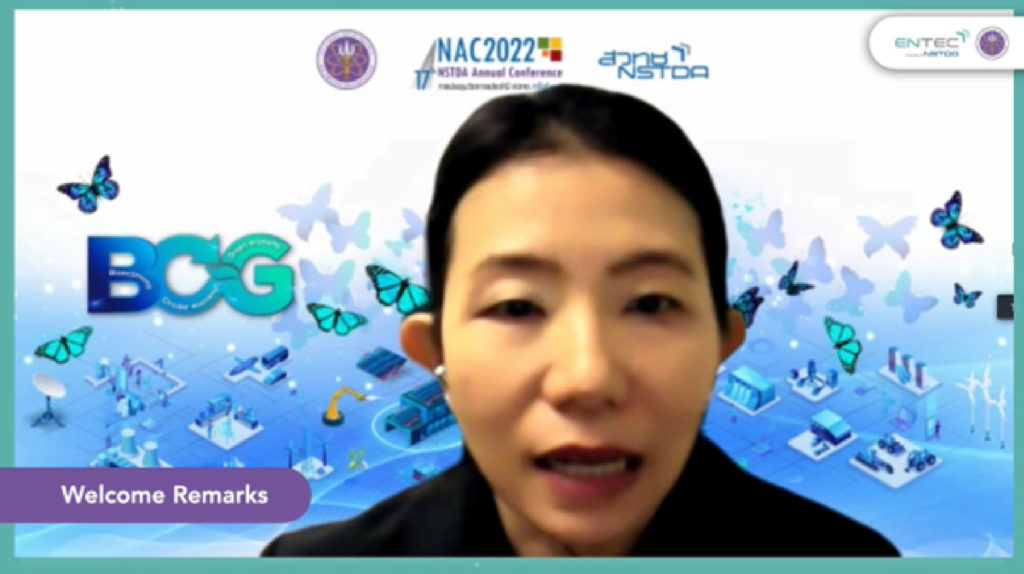
Executive Director, National Energy Technology Center (ENTEC)
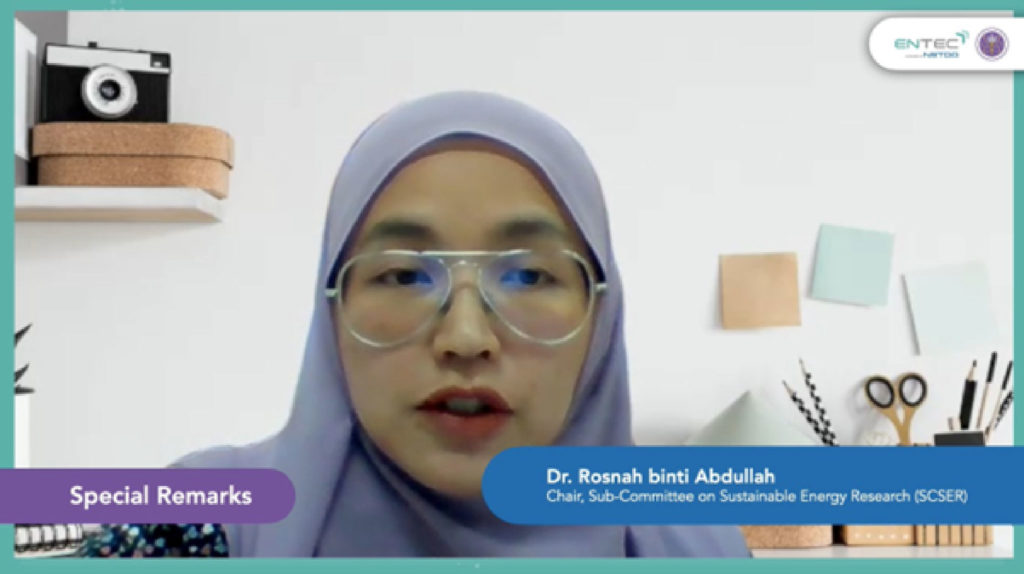
Chair, Sub-Committee on Sustainable Energy Research (SCSER)
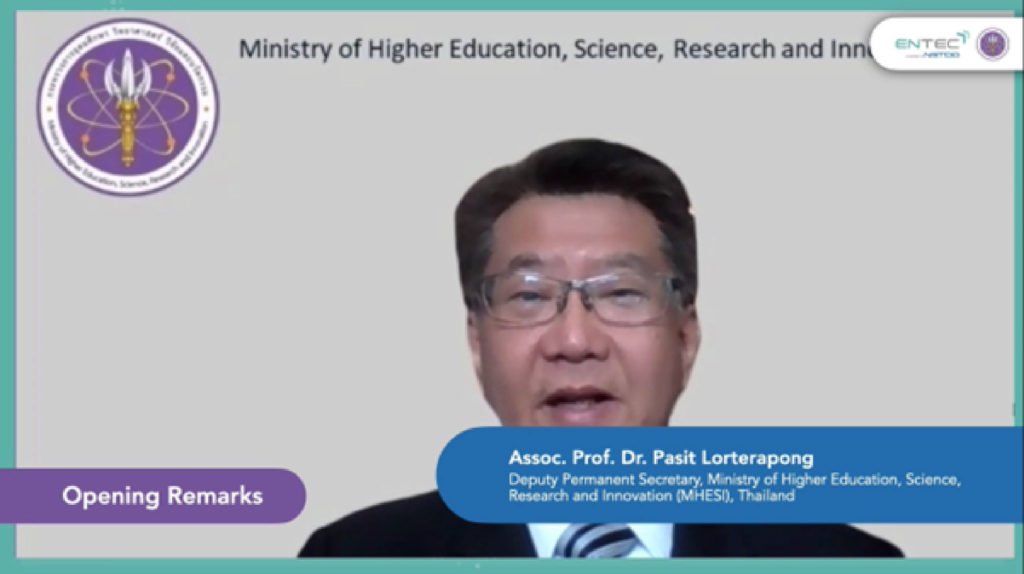
Deputy Permanent Secretary, Ministry of High Education, Science, Research and Innovation (MHESI)
In the session on “Increasing Attention on Resilience Enhancement of Energy Sector”, Dr. Kampanart Silva and Mr. Pidpong Janta, ENTEC, Thailand co-presented the first presentation on Global Research Trend related to Energy Resilience and Climate Adaptation in Energy Sector. Dr. Kampanart introduced the background of the workshop and past activities to promote energy resilience in ASEAN. Mr. Pidpong presented global trend of energy resilience research and possible directions for future research. The second presentation on the topic of APEC Energy Resilience Task Force and Its Activities was delivered by Mr. Michael Sinocruz, OIC Director, Energy Policy and Planning Bureau, Department of Energy, Philippines. He placed importance on strategies to promote energy resilience concept in APEC region and shared lessons learned in the context of Philippines. In the discussion session, it was emphasized that practical guidelines and hands-on energy resilience assessment should be conduced and extended to state members and economies.
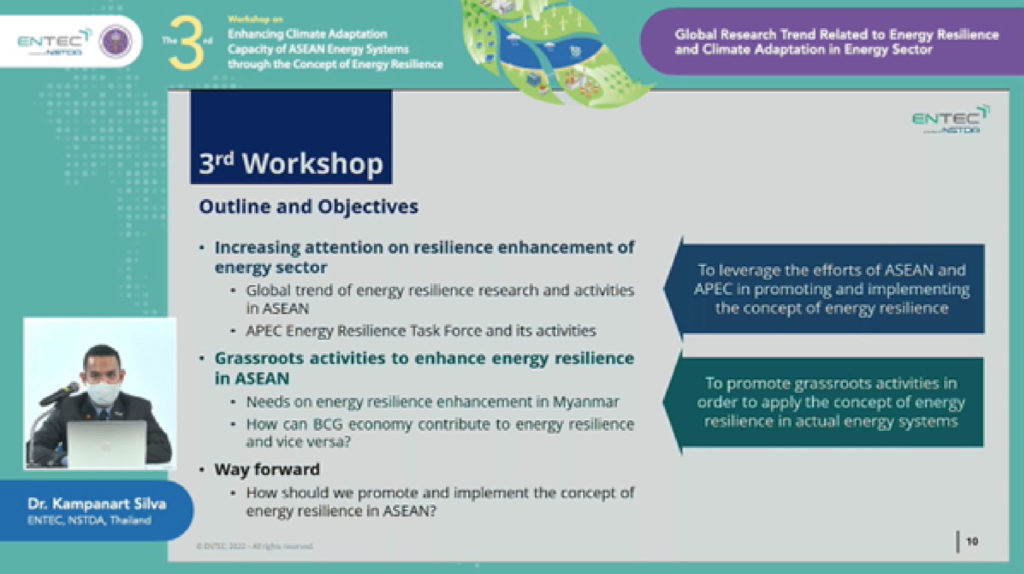
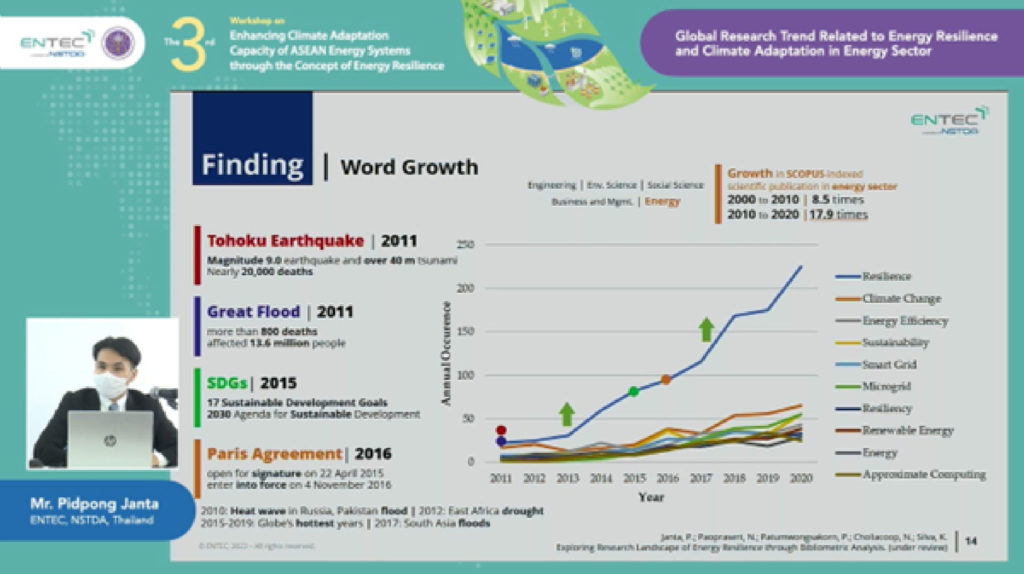
Research Assistant, National Energy Technology Center (ENTEC)
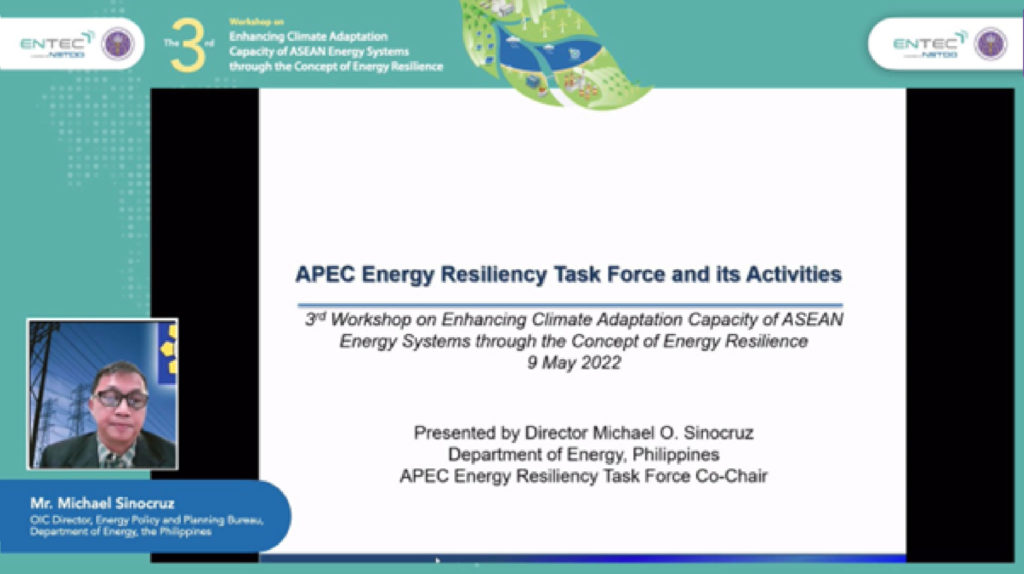
OIC Director, Energy Policy and Planning Bureau, Department of Energy, Philippines
The second session on “Grassroots Activities to Enhance Energy Resilience in ASEAN” started with the presentation on Needs on Energy Resilience Enhancement in CLMV Countries: An Example from Myanmar delivered by Miss Aye Myat Theint Kyaw, Assistant Researcher, Thailand Advanced Institute of Science and Technology and Tokyo Institute of Technology (TAIST-Tokyo Tech). She shared her view on the needs on energy resilience assessment in the country. The second presentation on How can BCG Economy Contribute to Energy Resilience and Vice Versa? in the session was delivered by Dr. Worajit Setthapun, Deputy Director, Program Management Unit for Human Resources & Institutional Development, Research and Innovation (PMU B), Thailand. Dr. Setthapun emphasized the importance of human resource development for energy resilience promotion and made clear the linkages among energy resilience, BCG economy, and grassroots activities. During the discussion, it was indicated that there should be further collaboration among organizations or departments to push forward energy resilience. Awareness on energy resilience should not only be made at the top management level but also at the local level and communities.
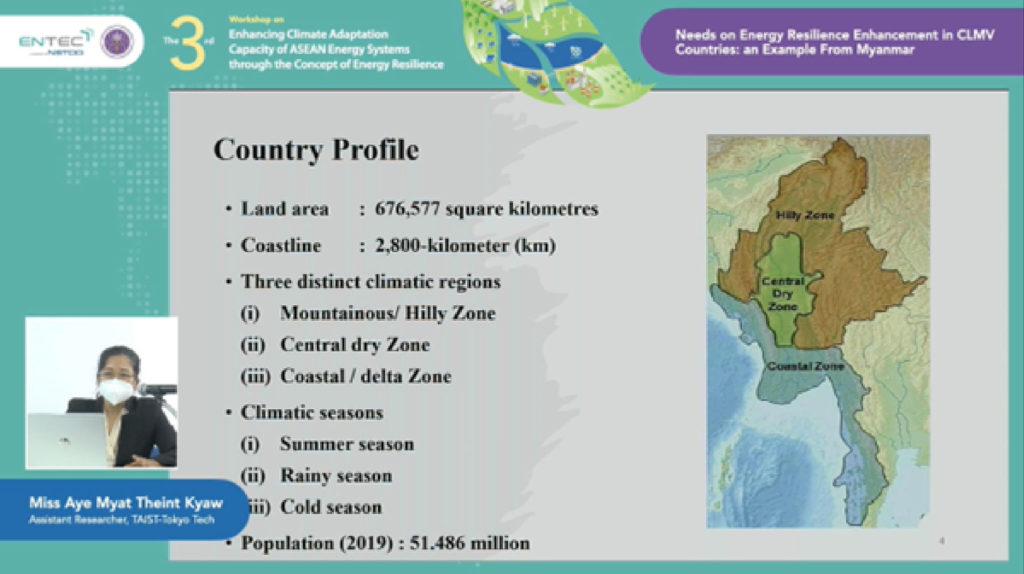
Assistant Researcher, Thailand Advanced Institute of Science and Technology and Tokyo Institute of Technology (TAIST-Tokyo Tech)
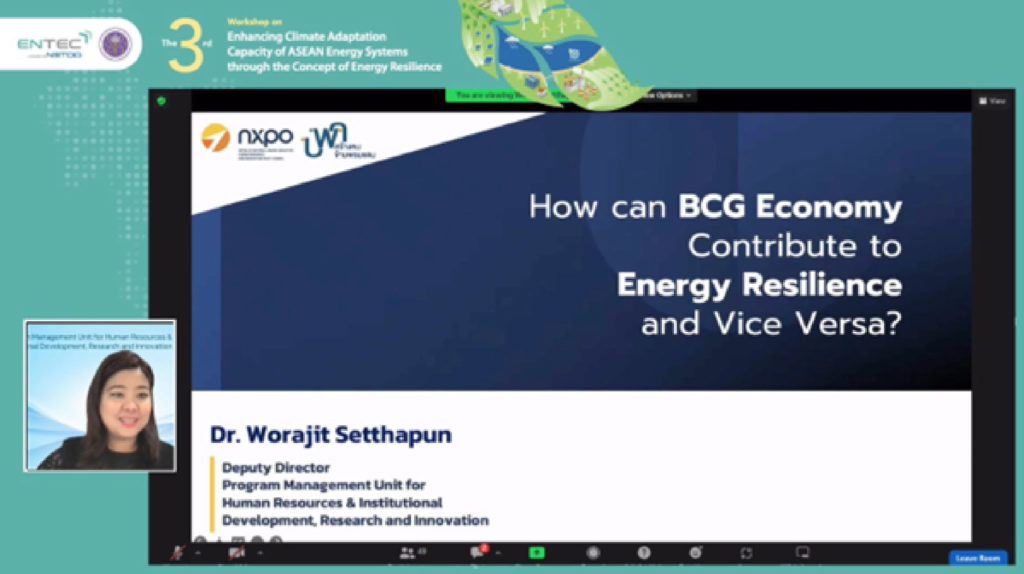
Deputy Director, Program Management Unit for Human Resources & Institutional Development, Research and Innovation (PMU B)
The last session on “How Should We Promote and Implement the Concept of Energy Resilience in ASEAN?” was moderated by Dr. Nuwong Chollacoop, ENTEC, Thailand. The discussion session was fruitful and received active engagement from participants. The discussion focused on the ways to promote energy resilience within and among regional bodies through: actual implementation of the concept, strengthening critical infrastructure, and capacity building through community learning centers and university network.
At the end of event, closing remarks was delivered by Ms. Sawamitree Promyos, Office of International Cooperation, MHESI, Thailand, stating that the workshop became a starting point for ASEAN and APEC regions to join hands and promote adaptive capacity of energy systems.
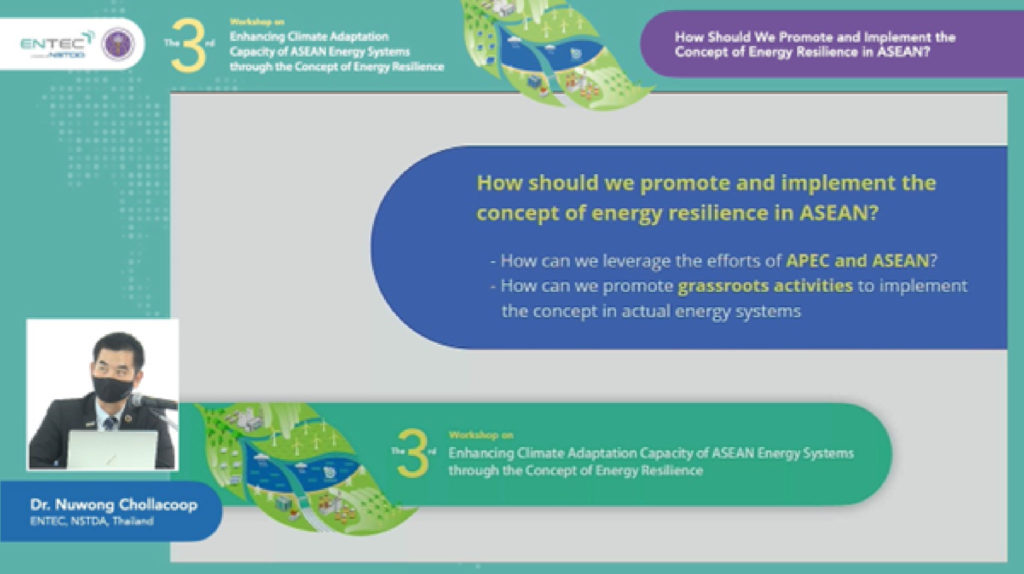
Renewable Energy and Energy Efficiency Research Team Leader
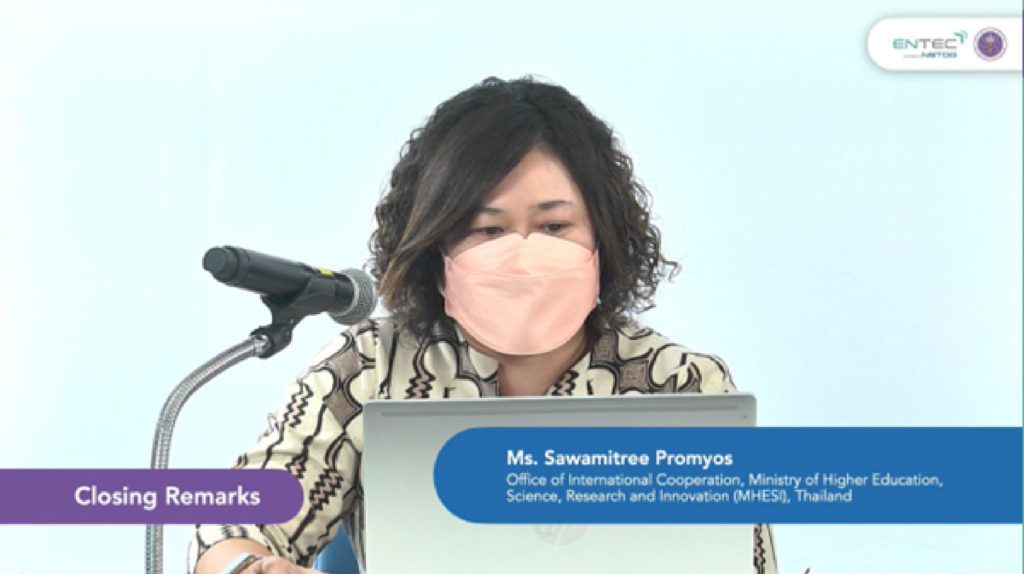
Over 80 participations from 11 member states/economies; Brunei Darussalam, Cambodia, Indonesia, Japan, Lao PDR, Malaysia, Myanmar, the Philippines, Republic of Korea, Singapore, and Thailand participated the workshop and contributed to the event’s objectives.


